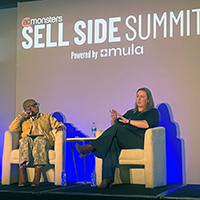Earlier this week, prior to ad:tech, we had the chance to join another gathering of those in the industry. We traveled to San Diego to participate in Experian Americas Sales Summit, joining a panel of those much smarter than us including a Lehman Brothers stock analyst, the CEO of Core Metrics, and the Director of Mobile Marketing at Google. For all the direct marketers reading, we regret to say that despite the inclusion of “mobile” in the title this long-time Google employee focused on the third-screen as opposed to overseeing our favorite company’s guidelines for those promoting mobile subscription services. As ones who have commented on Experian’s entrance into the interactive world and our previously bullish viewpoints about their chances for dominance, we visited to provide a state of the industry update and hopefully a few intelligible points about the company’s chances for continued success. Our bullish viewpoints haven’t changed, both on the industry and Experian Interactive’s leveraging its assets, especially its offline ones, to become one of the most important players in online customer acquisition. It doesn’t hurt that the company has immense resources, both in money and personnel. Missing from the reasons as to why they will persevere is something that has allowed them to grow in the past, the assumption of media risk. Let’s look at their mortgage unit, LowerMyBills as an example.
While now offering lead generation services for multiple verticals, LowerMyBills became best known for their role in mortgage lead generation. The company connected consumers with those who could offer loan products, buying billions of impressions, countless keywords, and email blasts. For the end buyer of the lead, LowerMyBills offers them a steady stream of users who meet their criteria on a performance basis. For the loan officer in Arlington, Virginia, working with LowerMyBills offers perhaps the best way for them to leverage the Internet. That same loan officer could buy an ad on Google or any other source for their target audience, but they would lose money. Thanks to the services of the lead generator, they get the best of all worlds, their target audience and on a cost per lead basis. Doing so from the lead generator standpoint is no trivial task. They only get paid on a per lead basis, but for them to gain scale in the number of leads they generate they must take the media risk. They must commit to millions of dollars in guaranteed spend with no real guarantee in the number of leads. Even for the places that allow them to spend on a CPA basis, they must compare favorably to other advertisers if they wish to continue receiving traffic. As a result it might allow them to control their profit, if they can’t get distribution, it doesn’t matter what they could earn on a profit per lead basis. All of which would suggest that LowerMyBills or a similar company’s not only willingness but also ability to bridge the gap between revenue on a cost per lead basis and cost on a wide matrix; but most notably cost per impression would offer them a competitive advantage.
What we see and what we argue is that risk assumption is a core competency but not a long-term competitive advantage. Companies that plan on risk assumption as a reason for existence should re-evaluate their strategy. As much as we’d like to go the duration of this article without mentioning Google, they help explain our main point. Over the course of their AdWords platform, the company has continually lowered the financial exposure for its advertisers. This process doesn’t occur overnight, and the amount of money that people have made by arbitraging CPA to CPC certainly makes it easy to think that taking the media risk makes for the pillar of a business. In Google’s eyes though, those taking the media risk offer no value except to get in the way of Google interfacing directly with a client. And, if there is one thing Google hates, its middle men, especially ones that they feel add no value. It’s why affiliate marketing continues to get squeezed and why as I learned from a friend, Google considers affiliates scum marketers. We must save for another day a discussion on the philosophical aspect to their initial embrace of affiliates only to do an about face when they don’t need them any more. As David Rodnitzky says of Google, they will go with you to the dance but go home with someone else. What matters is understanding their trends to isolate anyone who isn’t the end advertiser and the complete mission on doing so.
Google’s policy towards affiliates and lead generators makes sense when viewed from the least common denominator point of view. Not all affiliates detract from the user experience, but those who act in a manner that clutters up results, hurt the chances for the rest, and Google will go after everyone just to grab a few. Those few jeopardize the relevancy across the broader user experience, and Google stands to lose a lot more than they could gain. It’s unfortunate for both the end advertiser and the affiliate. Advertisers are advertisers for a reason. The loan officer might want more traffic, but that person will never excel in Internet advertising. They want a specialist to help. They don’t want to become experts in search, and even if they could buy leads from Google, they still want a person to help them, to make them feel good and feel like they get the most from what is out there. The fallacy of the argument against arbitragers says that if someone will spend $1 directly but only $.8 indirectly, then have the former. With arbitragers, affiliates, risk takers, outsourced sales people, whatever the name, you don’t just have $.8, you have multiple times that as they create the most optimal coverage, turning that $.8 into $3 or $4 for Google. Alas, Google thinks they could do it better and have $7 or $8, and if they have their way, that $3 to $4 currently available to the arbitrage goes to zero. And, where Google goes others follow; other platform companies follow, even ad networks. So, if you are in the business of making money by playing the spread just know that you face a serious uphill battle. It is still an incredibly valuable core competency but not sufficient to sustain the business over the long haul. If that is your business, don’t fret. Just about everyone has been in the cross-hairs of Google – from website optimization to ad servers. How long until search engine management companies are next? Are they not just affiliates but those whose efforts are less-aligned than affiliates?



